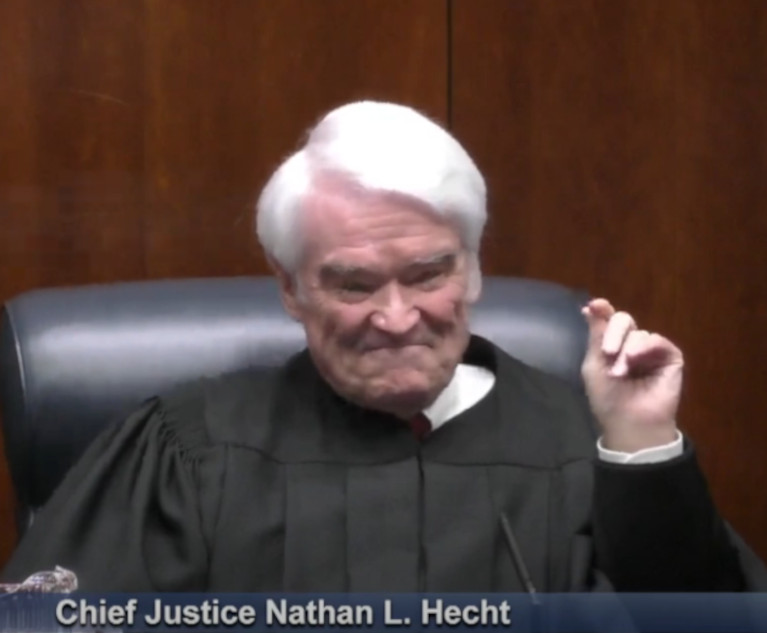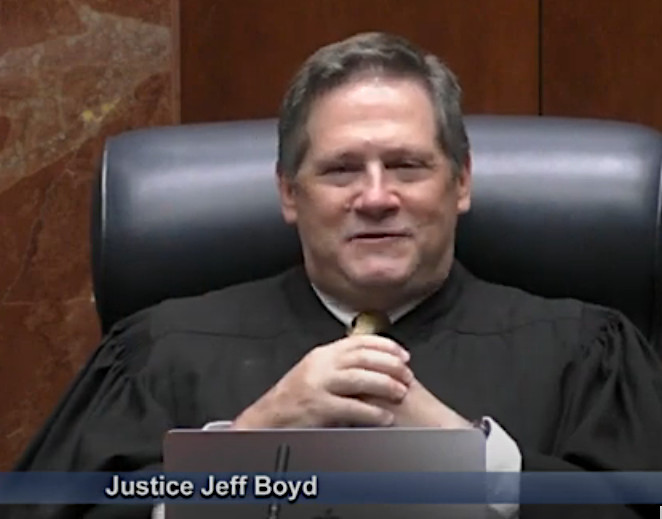 Michael P. Maslanka, assistant professor of law, UNT Dallas College of Law.
Michael P. Maslanka, assistant professor of law, UNT Dallas College of Law.Three Stories to Ponder During Shelter-in-Place Order
I'm entering week three of sheltering-in-place and thinking about the stories of James Stockdale in a POW camp in North Vietnam; concentration camp survivor Viktor Frankel; and Dante's "The Inferno."
April 10, 2020 at 03:22 PM
3 minute read
I sit in my Dallas apartment as I tap this out, and I'm entering week three of sheltering-in-place. It's a Saturday night. I am thinking about the stories we rely on to pull us through hard times. Here are three of mine.
It's the 1960s, the Vietnam War rages on. James Stockdale, a naval aviator, is shot down over North Vietnam. He becomes the ranking officer of the Hanoi Hilton, a POW camp. He survived and ultimately returns home. How? It's called the Stockdale Paradox. Stockdale, who later rose to the rank of admiral, explained that you must think two thoughts at once; you are in a world of s____ and must fully acknowledge your predicament. Yet at the same time you must know and believe fully that someday this ordeal will end.
The trick is understanding that the ordeal ends when it ends. Those who did not survive placed artificial deadlines on their life: we will be out by the holidays, or by Easter, or by the Fourth of July. Stockdale says that they died of a broken heart. Read more about it in "Good to Great," where I first heard of the paradox. Stockdale gave credit to Stoic philosophy for his insights that he studied at Stanford after graduating from the Naval Academy.
Speaking of Stoicism, I am reading "Man's Search for Meaning," from concentration camp survivor Viktor Frankel. Frankel's message is that we cannot control what happens to us—zero control—but we are 100% in control of our reaction to it. This reaction is our existential space, which is very small but very real. No one and nothing can deprive us of it. We can only forfeit it but it can never be taken from us.
Frankel adds that those who survived the camps found meaning in their terrible experiences. They shaped the moment and dictated the story line. My colleague, who is younger than me, said she braved the grocery store aisles to help an older and car-less downtown resident to stock up on food. Or a former student and current brother in the law, who is on a three week leave from his firm to use his RN degree and experience to help our fellow citizens in New York City. Or taking time to listen—really listen—to the assistant of my financial planner on how she is trying to help a stranded son in New York City. Our choice. Always has been hasn't it?
And read or reread "The Inferno," by Dante. The protagonist and the poet Virgil walk through Hell. It starts with a cold open, where the protagonist is gob-smacked by life (sounds familiar); "At the midpoint of the path through life, I found myself / lost in a wood so dark, the way ahead was blotted out." They stagger on and on through one hellish vista and then yet another, until they see at journey's end, a light above and ahead. Dante writes, "We did not care to rest / but climbed and climbed until we saw / an opening, and through it were laid bare / eternal beauties that the Heavens hold / And walking out, we saw once more the stars." Stay well.
This content has been archived. It is available through our partners, LexisNexis® and Bloomberg Law.
To view this content, please continue to their sites.
Not a Lexis Subscriber?
Subscribe Now
Not a Bloomberg Law Subscriber?
Subscribe Now
NOT FOR REPRINT
© 2025 ALM Global, LLC, All Rights Reserved. Request academic re-use from www.copyright.com. All other uses, submit a request to [email protected]. For more information visit Asset & Logo Licensing.
You Might Like
View All


Paxton Boasts as Texas Supreme Court Splits on Disciplining First Assistant Attorney General
4 minute read
Trending Stories
- 1Milbank, Wachtell, Ropes and Pittsburgh Duo Aim to Save Nippon Steel-U.S. Steel Merger
- 2A Top Connecticut Lawyer Has Resigned
- 3Just Ahead of Oral Argument, Fubo Settles Antitrust Case with Disney, Fox, Warner Bros.
- 4Best Practices for Adopting and Adapting to AI: Mitigating Risk in Light of Increasing Regulatory and Shareholder Scrutiny
- 5FOMO Run Amok? Resolve of Firms Chasing AI Dreams Tested by Sky-High Costs
Who Got The Work
Michael G. Bongiorno, Andrew Scott Dulberg and Elizabeth E. Driscoll from Wilmer Cutler Pickering Hale and Dorr have stepped in to represent Symbotic Inc., an A.I.-enabled technology platform that focuses on increasing supply chain efficiency, and other defendants in a pending shareholder derivative lawsuit. The case, filed Oct. 2 in Massachusetts District Court by the Brown Law Firm on behalf of Stephen Austen, accuses certain officers and directors of misleading investors in regard to Symbotic's potential for margin growth by failing to disclose that the company was not equipped to timely deploy its systems or manage expenses through project delays. The case, assigned to U.S. District Judge Nathaniel M. Gorton, is 1:24-cv-12522, Austen v. Cohen et al.
Who Got The Work
Edmund Polubinski and Marie Killmond of Davis Polk & Wardwell have entered appearances for data platform software development company MongoDB and other defendants in a pending shareholder derivative lawsuit. The action, filed Oct. 7 in New York Southern District Court by the Brown Law Firm, accuses the company's directors and/or officers of falsely expressing confidence in the company’s restructuring of its sales incentive plan and downplaying the severity of decreases in its upfront commitments. The case is 1:24-cv-07594, Roy v. Ittycheria et al.
Who Got The Work
Amy O. Bruchs and Kurt F. Ellison of Michael Best & Friedrich have entered appearances for Epic Systems Corp. in a pending employment discrimination lawsuit. The suit was filed Sept. 7 in Wisconsin Western District Court by Levine Eisberner LLC and Siri & Glimstad on behalf of a project manager who claims that he was wrongfully terminated after applying for a religious exemption to the defendant's COVID-19 vaccine mandate. The case, assigned to U.S. Magistrate Judge Anita Marie Boor, is 3:24-cv-00630, Secker, Nathan v. Epic Systems Corporation.
Who Got The Work
David X. Sullivan, Thomas J. Finn and Gregory A. Hall from McCarter & English have entered appearances for Sunrun Installation Services in a pending civil rights lawsuit. The complaint was filed Sept. 4 in Connecticut District Court by attorney Robert M. Berke on behalf of former employee George Edward Steins, who was arrested and charged with employing an unregistered home improvement salesperson. The complaint alleges that had Sunrun informed the Connecticut Department of Consumer Protection that the plaintiff's employment had ended in 2017 and that he no longer held Sunrun's home improvement contractor license, he would not have been hit with charges, which were dismissed in May 2024. The case, assigned to U.S. District Judge Jeffrey A. Meyer, is 3:24-cv-01423, Steins v. Sunrun, Inc. et al.
Who Got The Work
Greenberg Traurig shareholder Joshua L. Raskin has entered an appearance for boohoo.com UK Ltd. in a pending patent infringement lawsuit. The suit, filed Sept. 3 in Texas Eastern District Court by Rozier Hardt McDonough on behalf of Alto Dynamics, asserts five patents related to an online shopping platform. The case, assigned to U.S. District Judge Rodney Gilstrap, is 2:24-cv-00719, Alto Dynamics, LLC v. boohoo.com UK Limited.
Featured Firms
Law Offices of Gary Martin Hays & Associates, P.C.
(470) 294-1674
Law Offices of Mark E. Salomone
(857) 444-6468
Smith & Hassler
(713) 739-1250






